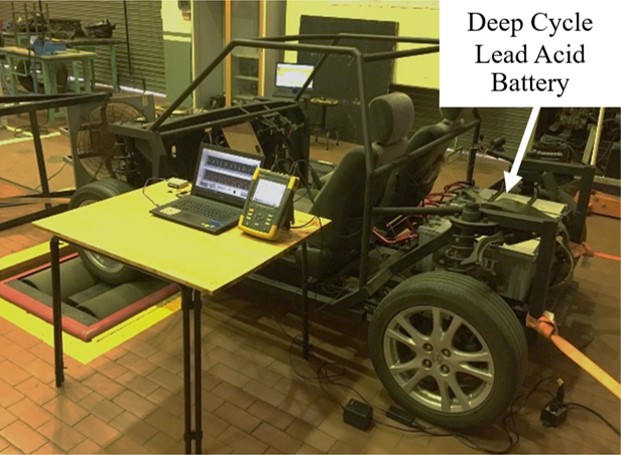Performance analysis of an electric car when using different battery types
Main Article Content
Abstract
This research focused on the performance analysis of an electric car when using different battery types. The electric car was built specified for the experiment. It was equipped with a 5 kW BLDC motor. The lithium-iron phosphate battery and deep cycle lead-acid battery with equal capacity of 48V 120 Ah were selected. The electric car was tested on a chassis dynamometer with two modes of testing, there were twice run of five urban cycles, and continuous drive on urban driving cycle until the electric car unable to reach 50 km/h. While testing, the electric power analyzer was conducted for recording various electric data. The results showed that the electric car when using lithium-iron phosphate battery could respond to reach the target velocity curve profile better than when using deep cycle lead-acid battery. In addition, the driving range per charge of the electric car using lithium-iron phosphate battery was longer as well.
Article Details

This work is licensed under a Creative Commons Attribution-NonCommercial-ShareAlike 4.0 International License.
This work is licensed under a Creative Commons Attribution-NonCommercial-ShareAlike 4.0 International License.
References
Hannappel, R. The impact of global warning on the automotive industry, AIP Conference Proceedings, Vol. 1871, 2017, pp. 1-6.
King Mongkut's University of Technology Thonburi. Electric vehicle technology and innovation research report, 2017, KMUTT, Bangkok.
Laoonual, Y. Assessment of electric vehicle technology development and its implication in Thailand, Research report, 2013, King Mongkut's University of Technology Thonburi and National Metal and Materials Technology Center, Bangkok.
Siphakhakon, A. and Techakittiroj, K. Electric vehicles: principle and design, 2013, Chulalongkorn University Printery, Bangkok.
Iclodean1, C., Varga, B., Burnete, N., Cimerdean, D., Jurchiș, B. Comparison of different battery types for electric vehicles, IOP Conf. Ser.: Mater. Sci Eng. Vol. 252, 2017, pp. 1-8.
Gis, W., Zóltowski, A., Bochenska, A. Testing of electric vehicle in driving cycles, Journal of KONES Powertrain and Transport, Vol. 19(4), 2012, pp. 1-15.
Goethem, S.V., Koornneef, G., Spronkmans, S. Performance of battery electric buses in practice: energy consumption and range, TNO Innovation for life, 2013, pp. 1-25.
Miri, I., Fotouhi, A., Ewin, N. Electric vehicle energy consumption modelling and estimation – A case study, International Journal of Energy Research, Vol. 45(1), 2021, pp. 501-520.
Mizutani, N., Matsui, H., Yano, K., Takahashi, T. Vehicle speed control by a robotic driver considering vehicle dynamics for continuously variable transmissions, Journal of Robotics and Mechatronics, Vol. 30, 2018, pp. 300-310.
Braun. A. and Rid, W. Energy consumption of an electric and an internal combustion passenger car. A comparative case study from real world data on the Erfurt circuit in Germany, Transportation Research Procedia, Vol. 27, 2017, pp. 468-475.
Chłopek, Z., Lasocki, J., Wójcik, P., Badyda, A.J. Experimental investigation and comparison of energy consumption of electric and conventional vehicles due to the driving pattern, International Journal of Green energy, Vol. 15, 2018, pp. 773-779.
United Nations, Regulation No. 101, Agreement, 2013, United Nations, Geneva.
Kung Long Batteries Industrial. Sealed Lead-Acid Batteries Technical Manual, Taiwan, URL: https://www.master-instruments.com.au/files/knowledge-centre/manufacturers-data/sla_batteries_technical_ manual_ed2_1_.pdf, accessed on 04/02/2021.
Carrilero, I., Alonso, J., Pereirinha, P.G., Anseán, D., Viera, J.C., González, M., Lithium Iron Phosphate and Lithium Titanate Oxide cell performance under high power requirements of electric bus applications, paper presented in 2018 IEEE Vehicle Power and Propulsion Conference (VPPC), 2018, Chicago, USA.
AIMScorp. LiFePO4 Instruction Manual, Nevada, URL: https://invertersrus.com/wp-content/uploads/2018/12/Aims-LiFePO4-Lithium-Battery-Manual.pdf, accessed on 04/02/2021.



